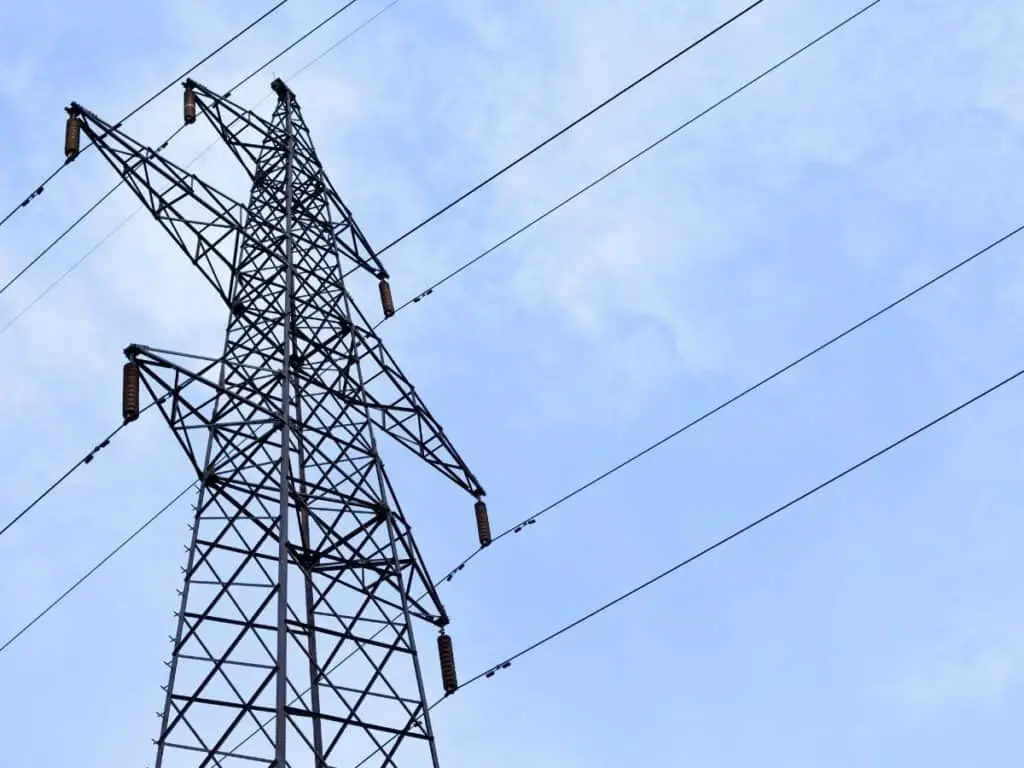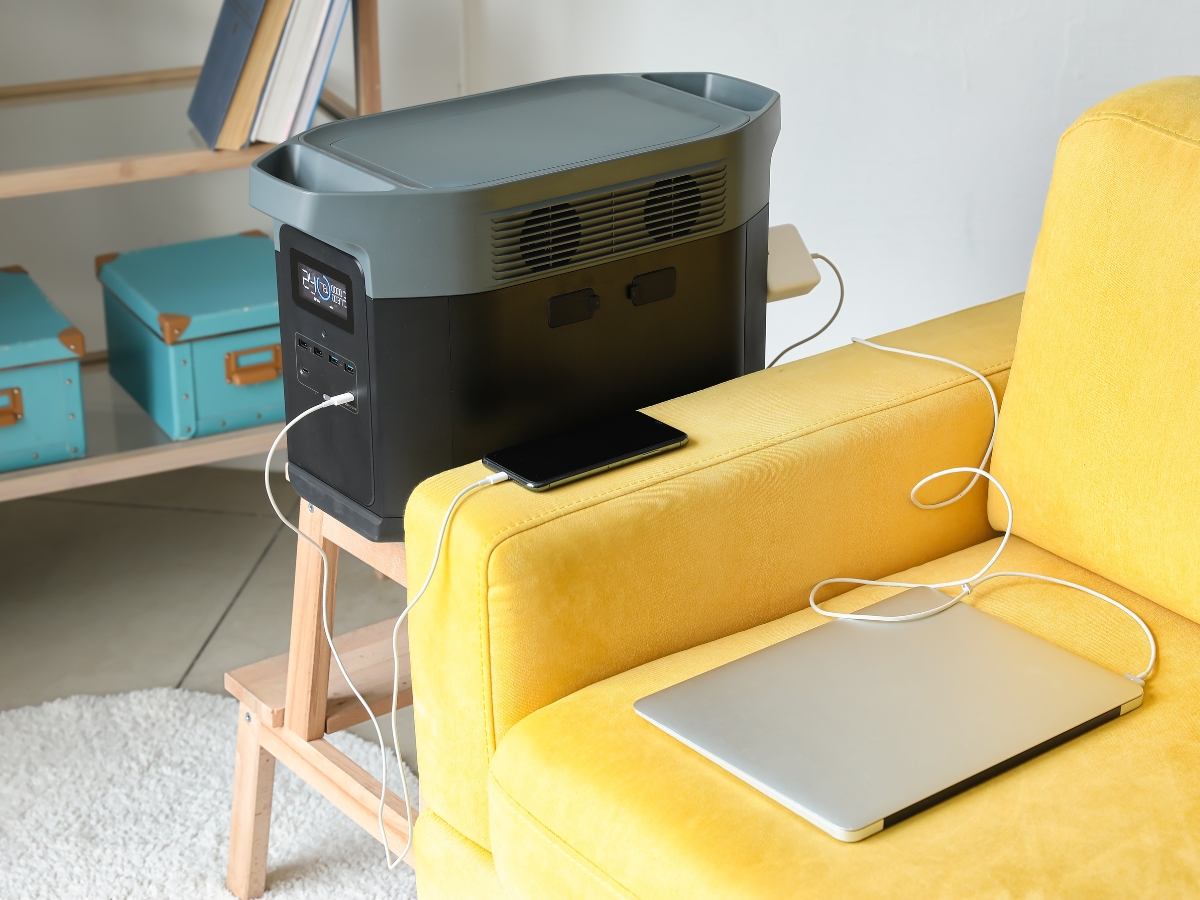As people living in this century are so used to electricity being around, when they pay attention to power lines and notice a buzzing noise, they often wonder if there’s something wrong and if the buzzing noise is normal.
This article looks at the following;
- Why power lines buzz
- When the buzz changes
- Safety near power lines
- Property values near power lines
Below, we’ll go over what the noise is, what affects the buzzing noise, and any health risks associated with being near power lines.

Why Do Power lines Buzz?
The noise you hear emanating from high-voltage power lines is the strength of the electrical field is greater than the field intensity needed to start an electrical current.
This is called the breakdown strength, and this discharge of energy surrounds the conductor, which you can see as a visible glow near the conductor. This glow is typical near high-voltage lines.
Power Lines
The buzzing you hear from power lines above you is called corona discharge, an electrical discharge that occurs when a charged conductor becomes ionized. This corona phenomenon is similar to a lightning bolt, only more minor.
A corona discharge produces a soft bluish glow and a soft buzz instead of the familiar blinding flash of light associated with lightning followed by a crack of thunder.
The noise you’re hearing is when electricity jumps through the air and occurs near high-voltage systems.
Power Mains
If you hear a humming or buzzing noise coming from power mains, this is due to the frequency of alternating current produced between 50 and 60 Hertz.
The humming from the alternating current frequency depends on which part of the world you live in, as they use different current frequencies.
Transformers
Sometimes the hum you hear is from a transformer, and the two main reasons a transformer would hum have to do with magnetostriction and stray magnetic fields.
Magnetostriction is when the ferromagnetic materials in the transformers interact with a magnetic field that alternates.
When this interaction occurs, the iron ore in the transformer expands and contracts subtly and produces some vibration. The higher the voltage going through the transformer, the more intense the humming sound.
What Affects The Buzz?
You may have noticed that there the buzz more often on some days than on others, but you’re not sure why. The corona effect around power lines and transformers is limited, except when certain weather conditions come into play.
The times when you notice a louder electrical buzzing is when it’s raining, snowing, or misting. You may also hear a more audible buzzing noise on days with higher humidity or when there’s fog.
This is because of the water droplets in the fog and rain and the water droplets in snow and mist speed up the breakdown of electricity in the air particles. Humidity is simply the concentration of water vapor in the atmosphere.
Increased water droplets in the air make the corona louder, making it easier to hear. When there are fewer water droplets in the air, you’ll notice the power lines and transformers are quieter as the voltage is too low to generate a buzzing noise.
Are There Any Health Risks With Power Lines?
As with any technology that we use regularly, there are always those who worry about the potential health risks of using or living near said technology. Electrical safety has changed a lot in the generations since people first had their homes wired.
They started with ceramic knobs and tubes with the connections exposed with no grounding. That’s unheard of with today’s electrical standards.
Some believe that power lines can cause potential health concerns, particularly EMF radiation. A national program called EMF-RAPID was created in the Energy Policy Act of 1992 to address those concerns. In 1995,
The American Physical Society stated that there wasn’t a consistent or significant link between EMF fields in power lines and cancer. It was impossible to find a causal relationship between the two.
The EMF-RAPID program had similar results and concluded that the evidence did not show that EMF fields showed a hazard to the health of humans and that lower levels of EMFs are safe.
Power Safety Tips
No matter where you are, whether it’s inside the safety of your home or walking around your neighborhood, staying safe around electricity is a must. Below are a few ways to keep yourself and your loved ones safe around power lines.
1. Be Careful With Long Objects Near Power Lines
Long objects include carrying metal ladders, shovels, tools, and other items that can conduct electricity. Be mindful of how close these items are to power lines and move them horizontally to avoid coming into contact with the power lines.
2. Don’t Attach Anything To Power Poles
As convenient as power poles are, it’s not advisable to attach anything to them, even if you see other people do so. This includes decorations, fencing, signs, posters, advertisements, or other objects you can attach to poles.
3. Don’t Climb Trees Near Power Lines
Climbing trees is a fun activity for children, teens, and adults, combining agility and skill. However, you should never climb trees near power lines as you may accidentally touch the power line, which can cause injury or death.
4. Don’t Fly Objects Near Power Lines
When you’re outside, you need to make sure not to fly anything near power lines. Flying objects include remote control toys, drones, balloons, paper airplanes, or kites.
They can contact power lines, short-circuiting components, or elicit an impulsive response to save the object from the power line or tree nearby.
Always remember to keep a safe distance from power lines, and don’t go near a downed power line when you see them. Now that you know where the buzzing noise comes from, what affects the noise, and there aren’t any health effects from being near power lines, you can rest easier knowing how to stay safe.
If you see a downed power line or partly downed power line, call your local power company and give them the information they need to fix the problem.
Do Power Lines Decrease Property Value?
In 2010, the Journal of Real Estate Literature published a research paper with six decades worth of data about property values and power lines.
The author found three main reasons why people believed power lines affected property values ranging from restrictions from being under transmission lines, how the power lines look, and beliefs that electromagnetic radiation can cause cancer.
Due to these factors, houses located near power lines have a lower property value up to 10% is the most common reduction, but there have been isolated cases where property values dropped up to 30%.
While properties near power lines sell for less, it’s not conclusive whether the power lines are entirely the cause.
Power lines also cause interference with WiFi signals, which makes WiFi router placement tricky.
As many people work from home or wish to have a strong WiFi signal for gaming, communication, and other needs, people are also more likely to avoid areas that have weaker WiFi signal strength.




